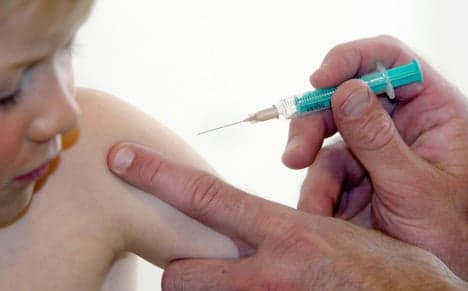Girl fighting for life after measles complications

A six-year-old girl who caught measles at seven months has developed a chronic and incurable brain inflammation, it was reported Monday. German doctors are warning that not enough parents are inoculating their children.
The girl, currently fighting for her life in a hospital in the Bavarian town of Aschaffenburg, is the third recent case of a child developing the life-threatening encephalitis SSPE as a consequence of catching measles as a baby in Germany. Another child that caught measles in 2006 died within a year of the same condition.
And a 13-year-old girl also died of SSPE in Bad Salzuflen in the state of North Rhine-Westphalia in October, twelve years after contracting measles as an infant.
The cases have led the German association of paediatricians (BVKJ) to revise the risk of developing encephalitis after contracting measles from 1 in 5,000 to 1 in 200. There were 313 registered measles cases in children in 2006.
The BVKJ is calling on adults born after 1970 to refresh their measles inoculations to reduce the chances of infecting babies, who are only allowed to be immunized after the age of 11 months. The number of measles cases in adults has jumped dramatically, from 623 last year to 1,571 in 2011. As many as 159 babies have already caught the disease this year.
BVKJ spokesman Sean Monks advised all adults who are not certain whether they are inoculated to avoid all contact with babies. “The only protection is immunization,” added the BVKJ’s Martin Terhardt.
Monks says that SSPE can take between five and eight years to develop after the measles infection. Adults have a much lower chance of developing it – only 27 people died of SSPE in Germany between 2005 and 2010.
The increase in cases of measles has also been linked to waning enthusiasm for inoculations. A recent study found that one in three German parents have prejudices about child inoculations, despite the lack of scientific proof of any negative side effects.
Scientists believe it takes a 95-percent immunization rate to kill off a virus in a population. According to the World Health Organization (WHO), there have been no new outbreaks of measles in North and South America in eight years, where inoculation rates are comparatively high.
The WHO says only 80 percent of children are inoculated against measles in Germany. The rate is even lower in other European countries, and Europe has already missed the WHO target of wiping out measles by 2010. There was a serious measles outbreak in North Rhine-Westphalia in early 2009, which claimed the lives of two children.
Doctors say that too many people still underestimate the dangers of measles, which results in complications in a quarter of cases. The WHO estimates that 450 people, mostly under the age of five, die of measles every year.
DAPD/DPA/The Local/bk
Comments
See Also
The girl, currently fighting for her life in a hospital in the Bavarian town of Aschaffenburg, is the third recent case of a child developing the life-threatening encephalitis SSPE as a consequence of catching measles as a baby in Germany. Another child that caught measles in 2006 died within a year of the same condition.
And a 13-year-old girl also died of SSPE in Bad Salzuflen in the state of North Rhine-Westphalia in October, twelve years after contracting measles as an infant.
The cases have led the German association of paediatricians (BVKJ) to revise the risk of developing encephalitis after contracting measles from 1 in 5,000 to 1 in 200. There were 313 registered measles cases in children in 2006.
The BVKJ is calling on adults born after 1970 to refresh their measles inoculations to reduce the chances of infecting babies, who are only allowed to be immunized after the age of 11 months. The number of measles cases in adults has jumped dramatically, from 623 last year to 1,571 in 2011. As many as 159 babies have already caught the disease this year.
BVKJ spokesman Sean Monks advised all adults who are not certain whether they are inoculated to avoid all contact with babies. “The only protection is immunization,” added the BVKJ’s Martin Terhardt.
Monks says that SSPE can take between five and eight years to develop after the measles infection. Adults have a much lower chance of developing it – only 27 people died of SSPE in Germany between 2005 and 2010.
The increase in cases of measles has also been linked to waning enthusiasm for inoculations. A recent study found that one in three German parents have prejudices about child inoculations, despite the lack of scientific proof of any negative side effects.
Scientists believe it takes a 95-percent immunization rate to kill off a virus in a population. According to the World Health Organization (WHO), there have been no new outbreaks of measles in North and South America in eight years, where inoculation rates are comparatively high.
The WHO says only 80 percent of children are inoculated against measles in Germany. The rate is even lower in other European countries, and Europe has already missed the WHO target of wiping out measles by 2010. There was a serious measles outbreak in North Rhine-Westphalia in early 2009, which claimed the lives of two children.
Doctors say that too many people still underestimate the dangers of measles, which results in complications in a quarter of cases. The WHO estimates that 450 people, mostly under the age of five, die of measles every year.
DAPD/DPA/The Local/bk
Join the conversation in our comments section below. Share your own views and experience and if you have a question or suggestion for our journalists then email us at [email protected].
Please keep comments civil, constructive and on topic – and make sure to read our terms of use before getting involved.
Please log in here to leave a comment.